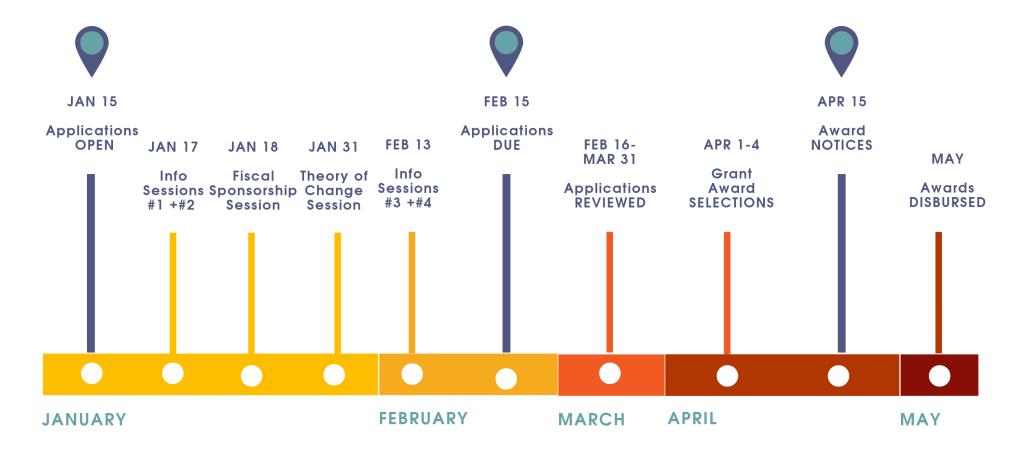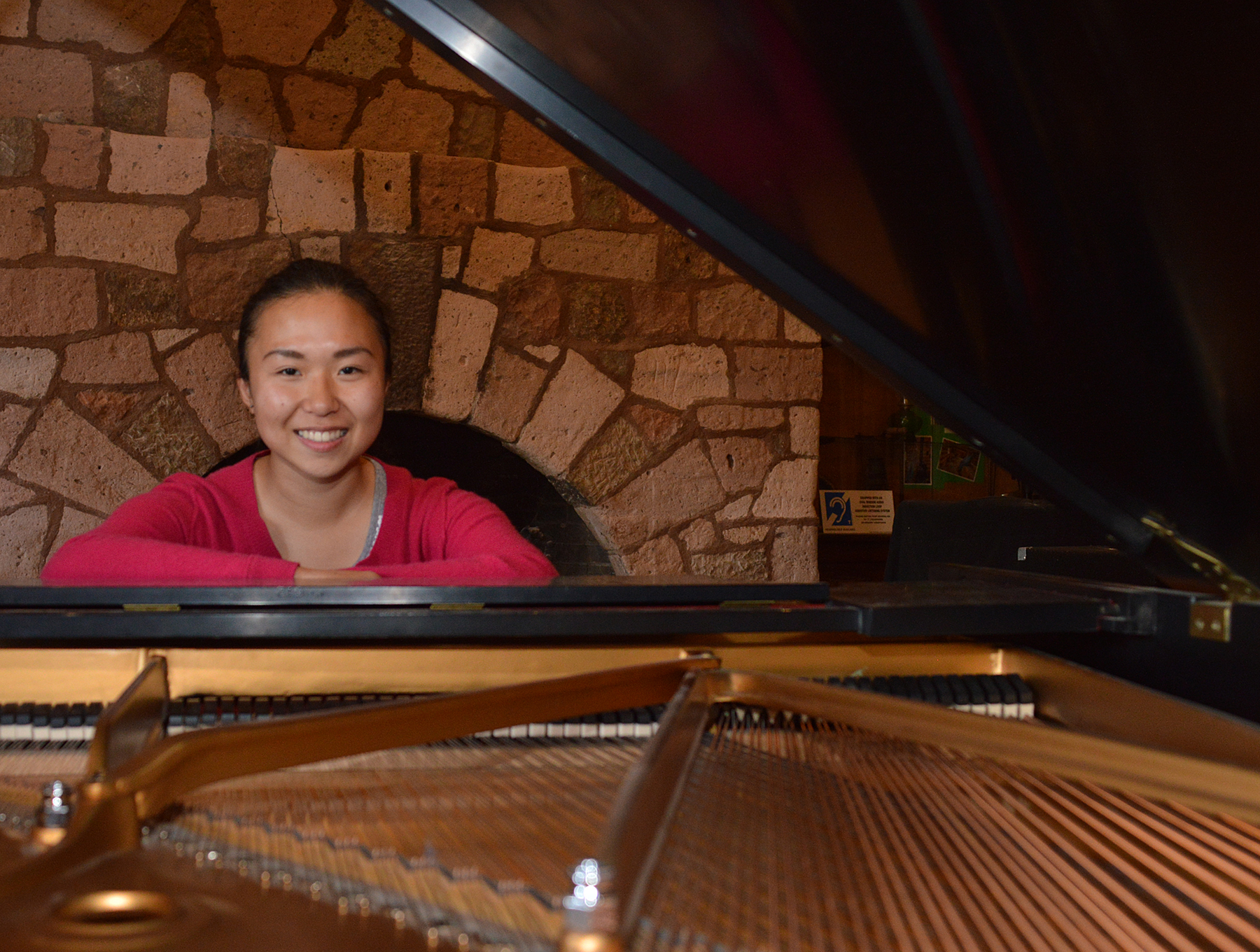Community Outreach Grants invest in learning rooted in the communities, relationships, cultures, languages, and customs of Northern New Mexico. These grants provide an opportunity to support programs, initiatives, and organizations that actively address the unique needs of our local communities of place, practice, and service, supporting learners of all ages.
2024 APPLICATION CLOSED
LANL Foundation announces 28 Community Outreach Grant awards in its 2024 cycle for a total investment of $140,000 across Northern New Mexico.
- Grant Awards: $5,000
- Grant Term: Recipients have two years to spend the funding.
IMPORTANT DATES:

Preparing to Apply for future cycles:
FIRST STEP:
If you do not already have an account within our Grants Portal, please create an account with the button below. (Please note, we are migrating to a new grants portal in the coming months, so will have a NEW grants portal for all 2025 cycles.)
VIRTUAL INFORMATIONAL SESSIONS:
As we prepare & launch our 2025 cycles, we will post information here regarding upcoming Zoom Q & A sessions (dates TBD, will be early 2025) to support you as you work on your application.
You will be able to pre-register for any help or informational sessions we offer via Zoom.
Be sure to follow us on social media and sign up for our newsletters to receive up-to-date cycle announcements, reminders, and information.
We plan to post 2025 timelines and cycle info by or before December 2024.
Funding Priorities:
In the 2025 Outreach Grants cycle, we will be operating in a new grants platform. As such, we will be taking this opportunity to refine ALL our processes, procedures, and application forms. If you applied in recent cycles, things will likely look or feel similar, but may have slight changes in questions or wording, format, and application layout. Our goal is that the new system will be streamlined and user-friendly. We welcome questions about our portal transition! Reach out to us with timeline and logistics questions at grants@lanlfoundation.org .
As you start to think about whether to apply in upcoming cycles – know that we welcome proposals that align with our work and strategic priorities, while we are also committed to supporting the impactful initiatives you are currently undertaking. We acknowledge that you are actively addressing the needs of your communities and schools.
Our Outreach Grants provide operational support, allowing flexibility in fund allocation and use.
Given the operational nature of the funding, our emphasis throughout the application and award process is to understand your role in your community and how a grant would support the work you are already doing. We focus on the overarching mission of your work and the relationships you (your Pueblo, Tribal Community, school, district, or organization) have within your communities of place, practice, and service. Rather than awarding funding to specific programs and projects, we aim to support your broader mission and the valuable connections you’ve cultivated.
On recent grant applications, we have typically requested information to help us understand how your overall work aligns with our Theory of Change. Specifically, we have asked applicants to identify a primary (and secondary) focus area from within our Theory of Change:
- Capable & Caring Adults
- Vibrant Opportunities for Learning
- Whole Child Development
- Strong Pathways to Careers
NOTE: If you have questions or want to delve into discussion about the areas of focus therein, we typically have held Zoom sessions scheduled that focus specifically on our Theory of Change.
We look forward to continued conversations and learning alongside you!
Required Documents:
501(c)3 PUBLIC CHARITIES
Up to 3 Letters of Support:
- Primary letter**: (required, for all) Must be signed by the head of organization, board chair, or governing authority on official organizational letterhead.
- Secondary Letter**: (required, if applicable) If any strategic school/district, Pueblo, tribe or Nation is named in your application as an active collaborator (different than a beneficiary), those partners must provide an additional Letter of Support.**
- Additional Letter:
- Required for Fiscally Sponsored applicants. Will serve as an additional Primary Letter of Support from the applicant.
- Optional for 501(c)3’s
**NOTE: Fiscally Sponsored Applicants will need to ensure these documents are from the Fiscal Sponsor.
Additional Circumstantial Requirements:
- Out-of-State Organizations: Out-of-State Entity Acknowledgement of Regional Commitment: A letter, on organizational letterhead, stating that your entity is specifically using LANL Foundation grant funds to serve our 7-county service area. Please provide context regarding your relationship to the region, specifically naming local/regional collaborators.
- NMCORS: Organizations with an approved extension to file with the New Mexico Attorney General’s Registry of Charitable Organizations, must provide a copy of the email/letter confirming the extension.
GOVERNMENTAL, QUASI-GOVERNMENTAL, AND EDUCATIONAL INSTITUTIONS
Eligible entities include tax exempt sovereign nations (Pueblos, Tribes, Nations), municipalities, counties, higher education institutions, public school districts, public schools, local and state-controlled charter schools, and BIE- and tribally-controlled schools.
Up to 3 Letters of Support:
- Primary letter: (required, for all)
- Schools: Letter of support from the School Principal or District Superintendent on School or District letterhead. Must include the School District’s Tax ID.
- School Districts: Letter of support from the District Superintendent on District letterhead include. Must include the School District’s Tax ID.
- Universities, Colleges or Educational Institutions: Letter of Support from a Chief Financial Officer or Institutional Leadership. Must include the institution’s Tax ID.
- Pueblos, Tribes and Nations: Letter of support from the Governor or Tribal Leadership on official letterhead.
- Secondary Letter: (required, if applicable) If any partners are named in your application as a collaborator–whether a school/district, a non-profit, or a Pueblo, tribe or Nation–those partners must provide an additional Letter of Support.
- Additional Letter: optional
Additional Requirement for Pueblos, Tribes, and Nations: Copy of most recent W-9
LANL Foundation staff also conduct an independent due diligence review to ensure compliance with federal (IRS) and state (NM Attorney General) regulatory agencies. Thank you for ensuring your filings are up-to-date.
Understanding How Applications Are Reviewed:
GRANTS COMMUNITY ADVISORY COMMITTEE:
The Grants Community Advisory Committee (GCAC) Members are rooted in their communities, and are committed to advocating for and amplifying the voices of our youth, teachers, school leaders, families, and others living and working within the ecosystem of education.
The GCAC advises LANL Foundation during the planning, implementation, and adjudication phases of the Foundation’s annual Community Outreach Grants process.
Through the GCAC, the LANL Foundation ensures our work is guided by those most proximate to issues and those most suited to advocate for the needs of our Northern New Mexico communities.
Throughout the review and selection process, the GCAC considers your role in the ecosystem of education and your engagement in our Theory of Change. Please see our rubric posted above to better understand how our Committee most recently scored applications in relation to the Theory of Change.
GEOGRAPHIC SCORE:
LANL Foundation staff utilize a geographic score to support the committee members as they consider and prioritize applications during the selection process. In all of LANL Foundation’s grantmaking, we prioritize investing in:
- Rural and tribal communities
- Homegrown and regionally-based organizations and programs
BUDGET NARRATIVE:
NOTE: We did not ask for or consider a budget in the 2024 Community Outreach Application. Instead, we sought to understand applicants’ prioritization of the potential funding. If awarded, we do ask that all awardees adhere to our indirect cost policy in planning and expenditures.
INDIRECT COST POLICY:
- Tribes, Pueblos & Nations: Up to 20 percent
- 501(c)3 / Public Charity: Up to 15 percent
- Quasi-governmental and governmental institutions, LEAs, Districts and Public Schools, including Charter and Tribal Schools: 0 percent
